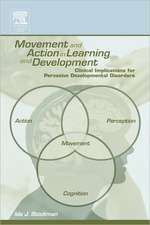Individual Motivation within Groups: Social Loafing and Motivation Gains in Work, Academic, and Sports Teams
Editat de Steven Karauen Limba Engleză Paperback – 22 oct 2019
- Explores individual motivation in multiple contexts such as work teams, educational settings, sports teams, and more
- Highlights recent research advances, future directions, and linkages with related research areas
- Discusses cross-cultural and international implications
- Examines factors that detract from and contribute to group motivation/individual motivation within groups
Preț: 470.42 lei
Preț vechi: 648.93 lei
-28% Nou
Puncte Express: 706
Preț estimativ în valută:
90.02€ • 93.42$ • 75.25£
90.02€ • 93.42$ • 75.25£
Carte tipărită la comandă
Livrare economică 08-22 martie
Preluare comenzi: 021 569.72.76
Specificații
ISBN-13: 9780128498675
ISBN-10: 0128498676
Pagini: 372
Dimensiuni: 152 x 229 x 30 mm
Greutate: 0.51 kg
Editura: ELSEVIER SCIENCE
ISBN-10: 0128498676
Pagini: 372
Dimensiuni: 152 x 229 x 30 mm
Greutate: 0.51 kg
Editura: ELSEVIER SCIENCE
Public țintă
Applied, social, and organizational psychologists; academics and researchers in these same areas, as well as those in the field of leadershipCuprins
Part 1: Foundations
1. Social Loafing and Motivation Gains in Groups: An Integrative Review
Part 2: Advances and Applications
2. Social Loafing in Organizational Work Groups: The Mitigating Effect of Servant Leadership
3. Individual Motivation, Team Learning, and Performance in Collaborative Academic Contexts
4. Effort Losses and Effort Gains in Sports Teams
5. Back to the Future: The Kohler Motivation Gain in Exergames
6. Sustaining Individual Motivation in High-Demand Team Environments
7. Temporal Stability of Effort Gains in Teams
Part 3: Linkages
8. Social Loafing in the Management of Social Dilemmas
9. Social Facilitation and Social Loafing: Opposite Sides of the Same Coin
10. Ostracism and Motivation in Groups
1. Social Loafing and Motivation Gains in Groups: An Integrative Review
Part 2: Advances and Applications
2. Social Loafing in Organizational Work Groups: The Mitigating Effect of Servant Leadership
3. Individual Motivation, Team Learning, and Performance in Collaborative Academic Contexts
4. Effort Losses and Effort Gains in Sports Teams
5. Back to the Future: The Kohler Motivation Gain in Exergames
6. Sustaining Individual Motivation in High-Demand Team Environments
7. Temporal Stability of Effort Gains in Teams
Part 3: Linkages
8. Social Loafing in the Management of Social Dilemmas
9. Social Facilitation and Social Loafing: Opposite Sides of the Same Coin
10. Ostracism and Motivation in Groups
Recenzii
"Steve Karau is a preeminent scholar known for his pioneering research on how working in groups can lead individuals to work especially hard, while at other times lead to social loafing. This book integrates classic and contemporary research conducted across a variety settings, which through the lens of the Collective Effort Model, provides new insights into when and why individuals expend high or low levels of effort when working in groups and teams. With chapters written by leading experts, this book seamlessly integrates basic and applied work in a clear and compelling fashion. This is an incredibly important book which I expect will aid practitioners in their quest to design better groups, while also aiding researchers in stimulating future work on this topic." -- Robert B. Lount, Jr., Professor of Organizational Behavior, Fisher College of Business, The Ohio State University, USA
"For this edited volume, Dr. Steven Karau has assembled an impressive team of top scientists to provide a cutting-edge review and analysis of the motivational processes that influence group productivity and other critical outcomes. While the book is highly scholarly, reflecting the expertise of the well-known authors, the writing is consistently assessible. Therefore, it will appeal not only to scholars, but also to anyone interested in understanding the psychological and social dynamics that influence the degree to which people exhibit effort, focus, pride, cooperation, and other key intragroup attitude, emotions, and behaviors. While much of the book focuses on work, academic, and sports settings, the basic principles, that are clearly illuminated, are applicable to any setting involving relatively small groups of people working together toward a common goal. It’s an excellent and much needed book that is sure to advance the science of group dynamics in general and stimulate new empirical work and theoretical developments. Given the scholarly yet accessible nature of the work, and the well-thought-out organization (10 chapters couched under three sections), I can also see this book being adopted for a graduate or advanced undergraduate course in social psychology, industrial-organizational psychology, business, management, or a related area." -- Jay W. Jackson, Ph.D., Professor of Psychology, Director, Intergroup Relations Lab, Purdue.
"Steve Karau's excellent Individual Motivation with Groups explains everything there is to know about the personal and interpersonal factors that cause groups of highly talented individuals to so often fail to reach their potential. Its chapters, written by the preeminent researchers in the study of motivation, performance, and team science, explain some of the field's greatest mysteries: When do other people spur us to work harder, and when do they sap our motivational zeal? What can be done to push groups to reach beyond their limitations, working at the highest level of performance possible? When does a group become greater than the sum of its parts? Each chapter summarizes prior research investigating motivation and performance—which is some of the most creative and theoretical rich work in the field of group dynamics—before offering an accessible interpretation of the work and suggestions for improving a group's performance. Anyone who truly cares about groups—their dynamics, their efficiencies, and the foibles—will want to read every one of the excellent chapters in this book." -- Donelson R. Forsyth, Professor, University of Richmond
"For this edited volume, Dr. Steven Karau has assembled an impressive team of top scientists to provide a cutting-edge review and analysis of the motivational processes that influence group productivity and other critical outcomes. While the book is highly scholarly, reflecting the expertise of the well-known authors, the writing is consistently assessible. Therefore, it will appeal not only to scholars, but also to anyone interested in understanding the psychological and social dynamics that influence the degree to which people exhibit effort, focus, pride, cooperation, and other key intragroup attitude, emotions, and behaviors. While much of the book focuses on work, academic, and sports settings, the basic principles, that are clearly illuminated, are applicable to any setting involving relatively small groups of people working together toward a common goal. It’s an excellent and much needed book that is sure to advance the science of group dynamics in general and stimulate new empirical work and theoretical developments. Given the scholarly yet accessible nature of the work, and the well-thought-out organization (10 chapters couched under three sections), I can also see this book being adopted for a graduate or advanced undergraduate course in social psychology, industrial-organizational psychology, business, management, or a related area." -- Jay W. Jackson, Ph.D., Professor of Psychology, Director, Intergroup Relations Lab, Purdue.
"Steve Karau's excellent Individual Motivation with Groups explains everything there is to know about the personal and interpersonal factors that cause groups of highly talented individuals to so often fail to reach their potential. Its chapters, written by the preeminent researchers in the study of motivation, performance, and team science, explain some of the field's greatest mysteries: When do other people spur us to work harder, and when do they sap our motivational zeal? What can be done to push groups to reach beyond their limitations, working at the highest level of performance possible? When does a group become greater than the sum of its parts? Each chapter summarizes prior research investigating motivation and performance—which is some of the most creative and theoretical rich work in the field of group dynamics—before offering an accessible interpretation of the work and suggestions for improving a group's performance. Anyone who truly cares about groups—their dynamics, their efficiencies, and the foibles—will want to read every one of the excellent chapters in this book." -- Donelson R. Forsyth, Professor, University of Richmond




















